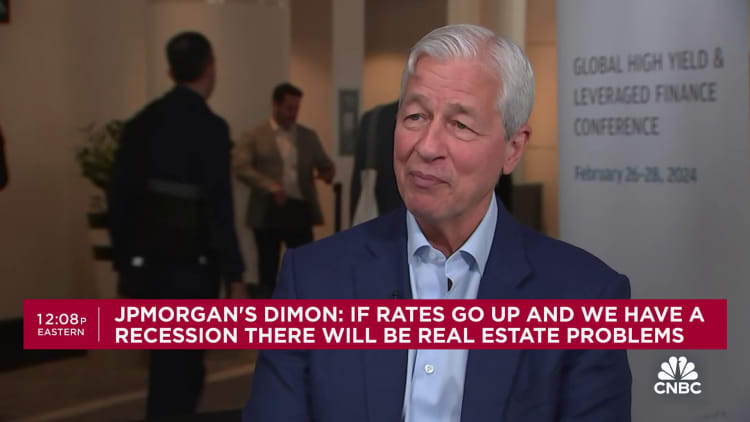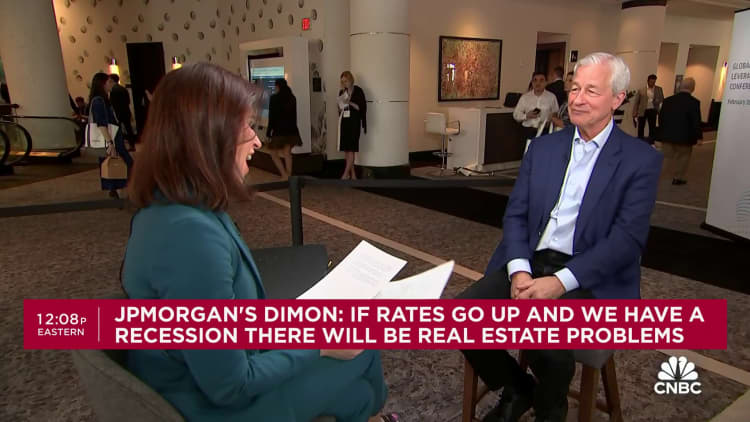
watch
now
JPMorgan
Chase
CEO
Jamie
Dimon
isn’t
worried
about
the
added
competition
from
a
bulked-up
Capital
One
if
its
$35.3
billion
takeover
of
Discover
Financial
gets
approved.
“My
view
is,
let
them
compete,”
Dimon
said.
“Let
them
try,
and
if
we
think
it’s
unfair,
we’ll
complain
about
that.”
Dimon,
speaking
to
CNBC’s
Leslie
Picker
at
a
Miami
conference,
acknowledged
that
if
regulators
approve
the
Capital
One-Discover
deal,
his
bank
will
be
eclipsed
as
the
nation’s
biggest
credit
card
lender.
But
that
didn’t
stop
him
from
praising
Capital
One
CEO
Richard
Fairbank,
who
he
credited
with
shaking
up
the
card
industry
in
a
way
that
ultimately
led
Dimon
to
becoming
CEO
of
a
predecessor
firm
to
JPMorgan
more
than
20
years
ago.
“Richard
is
why
I’m
here,”
Dimon
said.
About
the
transaction,
he
added,
“I’m
not
worried
about
it
really,
but
we
do
track
everything
he
does.”

watch
now
Last
week,
Capital
One
announced
the
biggest
proposed
merger
of
the
year,
one
that
could
transform
the
trillion-dollar
credit
card
industry.
By
acquiring
Discover,
Fairbank
is
both
bulking
up
as
a
lender
and
boosting
the
smallest
of
the
payments
networks
after
Visa,
Mastercard
and
American
Express.
“The
credit
card
business
…
they’ll
be
bigger
and
[have]
more
scale,”
Dimon
said.
“They’re
very
good
at
it.
I
have
enormous
respect
for
Richard
Fairbank
and
Capital
One.”
It’s
unclear
if
Capital
One
can
create
a
true
alternative
to
the
dominant
card
networks
with
this
deal,
Dimon
said.
He
added
that
Capital
One
will
have
an
“unfair
advantage
versus
us”
in
debit
payments,
owing
to
the
fact
that
legislation
known
as
the
Durbin
Amendment
caps
debit
fees
for
large
banks,
but
not
Discover
or
American
Express.
“Of
course,
I
have
a
problem
with
that,”
Dimon
said.
“You
know,
like
why
should
they
be
allowed
to
price
debit
different
than
we
price
debit
just
because
of
a
law
that
was
passed?”
More
broadly,
Dimon
said
he
also
favored
allowing
small
banks
to
merge.
A
wave
of
industry
consolidation
has
been
expected
after
the
tumult
of
last
year’s
regional
banking
crisis,
but
only
a
trickle
of
smaller
deals
have
happened
so
far
as
executives
are
unsure
if
they
can
pass
regulatory
muster.
The
biggest
question
remaining
about
the
Capital
One
deal
is
whether
regulators
will
approve
it.
More
than
a
dozen
Democrat
lawmakers
including
Sen.
Elizabeth
Warren,
D-Mass.,
signed
a
letter
to
the
Federal
Reserve
and
the
Office
of
the
Comptroller
of
the
Currency
on
Sunday
urging
them
to
block
the
agreement.
“To
protect
consumers
and
financial
stability,
we
urge
you
to
block
this
merger
and
strengthen
your
proposed
policy
statement
to
prevent
harmful
deals
in
the
future,”
they
wrote.
Don’t
miss
these
stories
from
CNBC
PRO:
